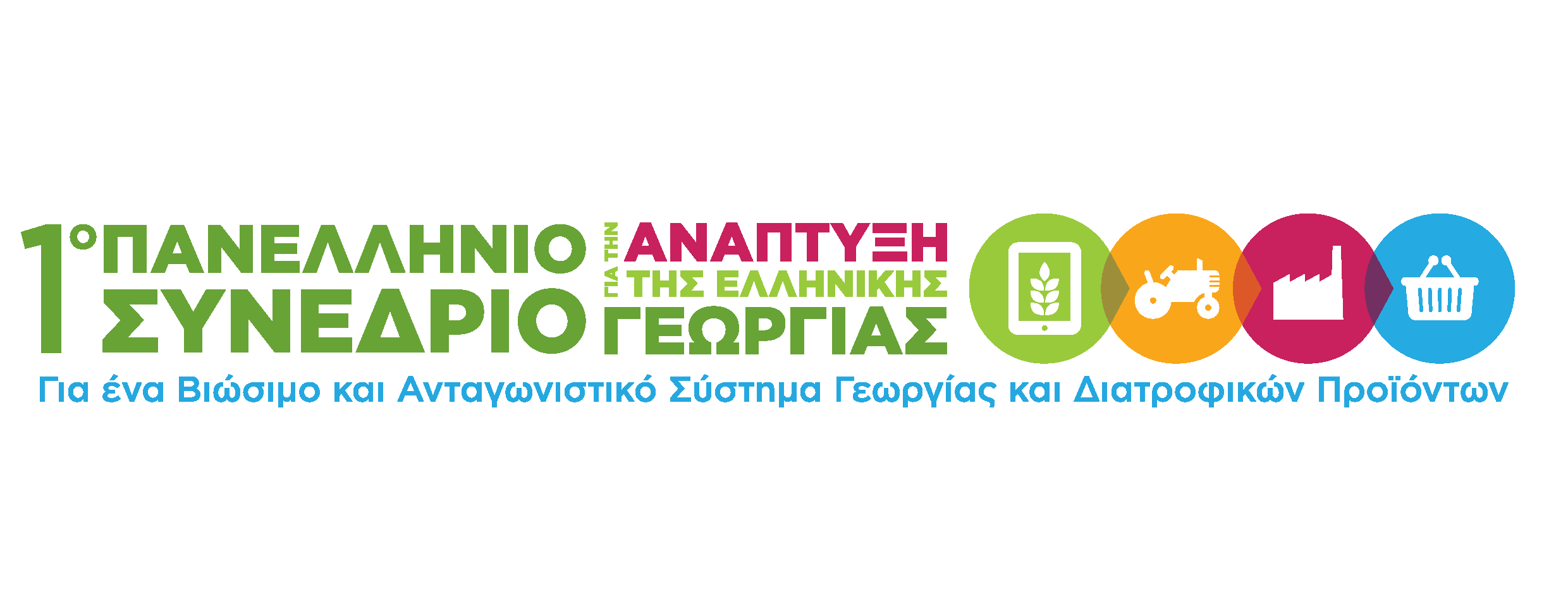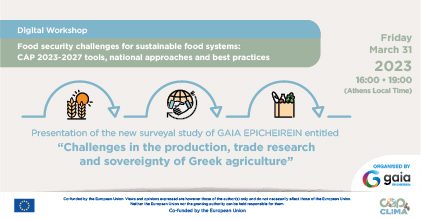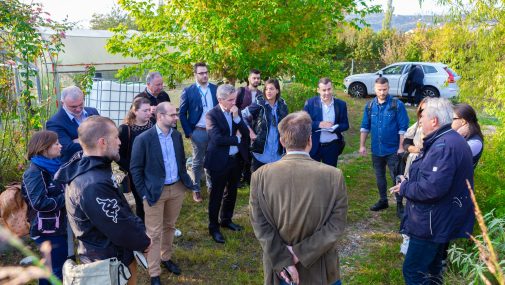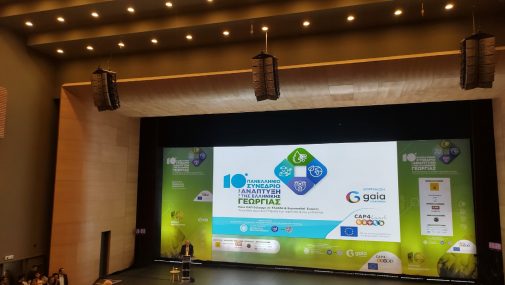This website uses cookies so that we can provide you with the best user experience possible. Cookie information is stored in your browser and performs functions such as recognising you when you return to our website and helping our team to understand which sections of the website you find most interesting and useful.
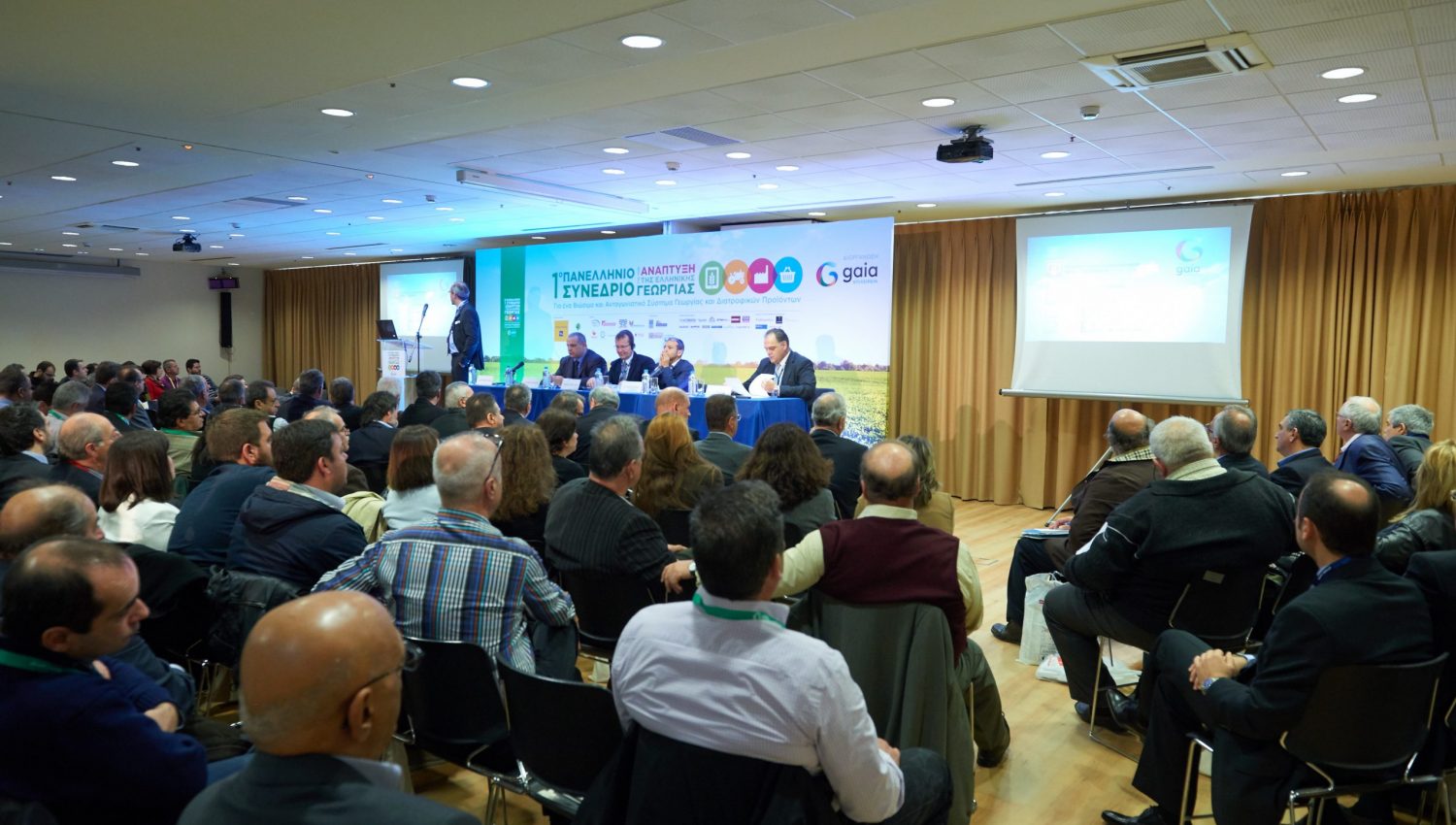
The development of Greek agriculture structured around organising farmers into sustainable producer organisations with an extroverted vision was the focus of the 1stPanhellenic Congress of GAIA EPICHEIREIN.
At the ‘Excelixi’ Centre for Sustainable Entrepreneurship in Kastri, on 26 and 27 November, twenty-seven distinguished speakers from various sectors sent a clear message regarding the future of the agricultural sector. More than 600 delegates, including Producer Organisations, Food Industry executives, cooperative representatives from all over Greece, as well as representatives of the political leadership, Academic and Research Community, filled the congress centre to capacity and made a clear statement about the new agricultural reality of Greece.
Addresses at the congress were made by Mr Karasmanis, Minister of Rural Development and Food, Mr Kanellis, President of GAIA EPICHEIREIN, Mr Karamichas, President of PASEGES, and Mr Pittas, representing the Federation of Hellenic Food Industries.
The Minister of Rural Development and Food noted, inter alia, that there is a national developmental policy for agriculture in place, even though it may take a few years for it to bear fruit.
Tzanettos Karamichas pointed out that everyone should come on board and that the CAP should complement the national agricultural policy, not the other way around.
Georgios Pittas highlighted the high quality of Greek products and stated that it is a key factor in the success and strengthening of national exports.
During their speeches, the secretaries of the Ministry of Rural Development and Food provided answers to vital questions that concern producers today.
More specifically, Dimitrios Melas, Secretary General for Agricultural Policy and International Relations at the Ministry of Rural Development and Food noted that through Community area aid, Greek producers shall receive €2 billion on an annual basis through the new CAP.
Meanwhile, Dimitrios Iatridis, Special Secretary for Community Resources & Infrastructure at the Ministry of Rural Development and Food stated that the current Rural Development Programme had achieved high levels of absorption, mentioning that 11,000 Young Farmers had received a first setup “bonus” within 5 months.
During the Congress, the contribution of the digital services provided by GAIA EPICHEIREIN for the enhancement of Greek agricultural production was highlighted.
In his address to the farming professionals who had filled the Congress centre to capacity, Ioannis Koufoudakis, CEO of GAIA EPICHEIREIN, invited them to join the dynamically growing family of GAIA EPICHEIREIN. At the same time, he announced that special information days would be organized in rural areas to enhance agricultural extroversion through the use of national and European financial instruments. Furthermore, with a focus on providing personalised services to farmers, he underlined the values of GAIA EPICHEIREIN which are based on the Production – Research – Innovation “triptych”, and stressed the importance of added value for agricultural products. Lastly, he underlined the necessity of establishing a national system for the provision of agricultural advice, which will contribute to ‘restarting’ the agricultural sector.
Georgios Kormentzas, Assistant Professor at the University of the Aegean and Chairman of the Strategic Planning Committee of GAIA EPICHEIREIN, analysed the major funding opportunities available amounting to €200 million, which concern business groups of the European agricultural innovation partnership.
After highlighting the contribution of GAIA EPICHEIREIN to reducing the high level of unemployment affecting the Greek countryside, all stakeholders were informed about the new prospects offered by the new CAP and the challenges that European programmes create for Greek agriculture.
More specifically, Pekka Pesonen, Secretary General of Copa-Cogeca, pointed in the direction of European developments by noting that Europe should undertake initiatives, so that research and innovation are expedited, training for farmers is intensified, and Young Farmers, in particular, are supported through investment programmes. Furthermore, he stressed that unfair and abusive practices in the food supply chain must be addressed.
Kleopatra Sidiropoulou, Secretary General of CEJA-European Council of Young Farmers, mentioned that the next Council of Ministers of Agriculture on 15 December in Brussels would be discussing the possibility of establishing a Fund through the European Investment Bank that will function as a guarantee mechanism for procuring loans to Young Farmers.
Furthermore, in the framework of securing financial instruments via the private sector, an important presentation was made by Christodoulos Antoniadis, a member of the BoD of GAIA EPICHEIREIN & Vice President of Piraeus Bank, who pointed out that the agri-food sector is the steam engine of the Greek economy, greatly contributing to the national GDP. Piraeus Bank believes in the Greek agricultural sector and in strategic partnerships that can lead to successful practices, and thus created the Contract Farming Programme. So far, 90 partnerships have been completed with agricultural enterprises and 14,000 producers have received funding in the amount of €440 million.
Finally, particular emphasis was given to methods of improving agricultural production and developing the entrepreneurship of small and medium-sized processing enterprises.
A characteristic example was that of Christos Giannakakis, President of the Association of Imathia’s Agricultural Cooperatives, who developed his own successful business activities. The Venus Growers network succeeded in attracting the interest of the global market through the financial support of European promotional programmes. At the same time, with the consensus and agreement of its members, it spread its wings and entered new markets, thus balancing the losses incurred by the Russian embargo. Soon, as Mr Giannakakis announced, we will see Imathia’s peaches in Saudi Arabia, the United Arab Emirates and Kuwait.




